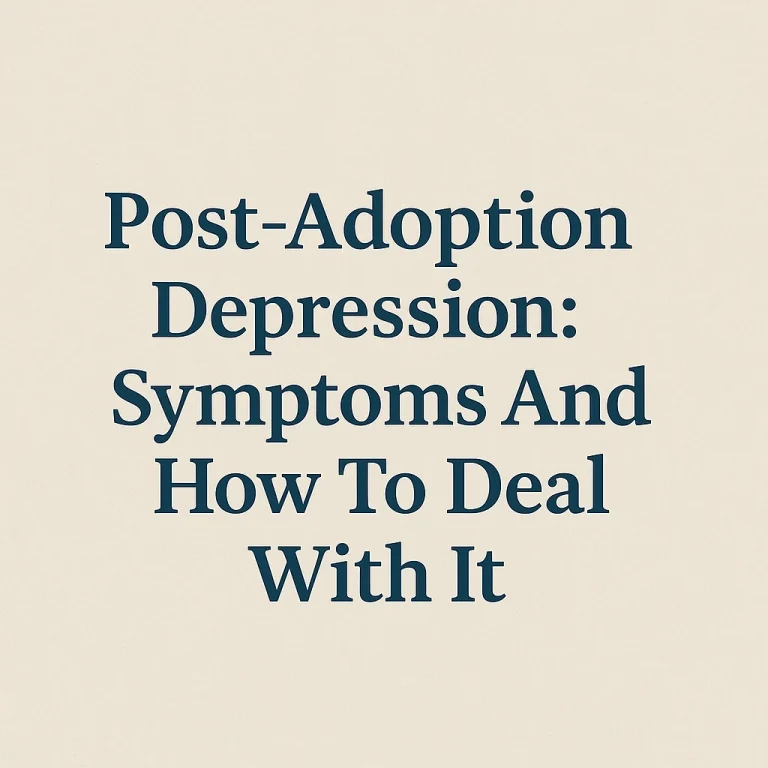Adult Adoption Process: 9 Remarkably Exciting Tips You Need

After an interview with a family law attorney, with over two decades of experience in adoption proceedings, I started witnessing many transformative times when adults choose to certify their family bond through legal adoption.
I am talking about the adult adoption process, which is one of the most interesting ways to formalize relationships that have long been built on trust, love, and commitment, beyond biology alone.
No matter who you are, a stepparent deciding to adopt your spouse’s grown children or an adult looking to honor a parental figure who raised you, it’s important to understand the adult adoption process, as it helps you to make informed decisions about your family’s future.
Understanding the Fundamentals of Adult Adoption:
Adult adoption is very different from child adoption in both requirements and complexity. While different states have different adult adoption processes, they generally involve fewer restrictions and a minimal timeframe compared to the traditional adoption process.
This legal mechanism allows adults over 18 to be adopted by other adults, which creates permanent parent-child relationships with all associated legal rights and responsibilities.
The most amazing thing about the adult adoption process is it’s ability to formalize relationships that has been built emotionally and practically.
Many families find themselves in situations where biological parents were absent or uninvolved, while other adults stepped in to provide love, guidance, and support. In this condition, adult adoption steps in to legally provide those missing bonds.
Unlike other adoptions, the adult adoption process does not need tedious home studies, background checks, or waiting periods in most jurisdictions.
The very first and most important requirement in this type of adoption is the adoptee’s consent, along with other necessary eligibility criteria, and completing the paperwork.
Many states offer online self-help resources, including forms and step-by-step guides to help you navigate the adult adoption process independently.
Think about factors like residency requirements, as some states mandate that either the adopter or adoptee must have lived in the state for a specific period before filing.
Additionally, research any restrictions on who can adopt whom, as some jurisdictions have age requirements or prohibitions on certain types of relationships.
Tip 1: Research Your State’s Specific Requirements Thoroughly:
The number one and best steps you must take to have a successful process in your adult adoption journey are to research thoroughly about the adult adoption requirements of your state. Every state has their laws for adult adoption and the differences can impact your experience.
Some states require minimal documentation, while others have more comprehensive requirements.
Contact your state’s family court system or consult with a local family law attorney to obtain accurate, current information about requirements in your area. In many states, you can get special self-help resources online, including forms and guides to help you navigate the process.
Consider other factors like residency requirements, because many states made it compulsory that either the adopter or adoptee must have lived in the state for a specific period before filing.
Finally, research to know if there are any restrictions in your jurisdiction about who can adopt whom, as some jurisdictions have age requirements or prohibitions on certain types of relationships.
Tip 2: Ensure All Parties Are Genuinely Committed To The Process:
The type of permanent legal relationship created through the adult adoption process is not easily broken; it is, therefore, important that you discuss with all parties involved, and let them know your expectations, motivations, and long-term commitment to the relationship.
This is not always a very easy decision to Discuss practical implications such as inheritance rights, medical decision-making authority, and potential impact on existing family relationships.
Many families are sometimes so worried about how biological relatives will react when they hear about adoption, while others are more concerned about the legal implications of the parent-child relationship.
Just be careful to know how everyone feels about your decision. Most importantly, ensure that the decision comes from genuine love rather than temporary emotions or external pressures.
Adult adoption is sweeter when all parties are enthusiastic participants who view the legal process as a celebration of their existing bond.
Tip 3: Gather Required Documentation Early:
Preparing well and starting early is the easiest way to have a smooth adult adoption process. Start gathering all the needed documents on time before you plan to file the petition.
Some of the most important requirements are a birth certificate for you and the adoptee, proof of identity, and proof of change of any kind. Some states may ask for proof of termination of parental rights (if the birth parents are still living), while others will only request consent from the adoptee.
Marriage certificates may be necessary if the adopter is married, and some jurisdictions require disclosure of criminal background information. I advise that you create a comprehensive file with different copies of all the gathered documents, as the court requires original or certified copies rather than photocopies.
Tip 4: Consider the Financial Implications Carefully:
Irrespective of the fact that the adult adoption process is not costly, unlike the minor adoptions, costs can still change suddenly.
Different jurisdiction charge different filing fee of $100 to $500. If you choose professional representation, expect to pay an attorney fee of $1,000 to $3000 dep, depending on the location and complexity.
Besides the non-costs of adult adoption, consider long-term financial stress, as adult adoption creates inheritance rights that require the adoptee to automatically become a legal heir and have rights to your estate.
This can affect estate planning, tax considerations, and relationships with other potential heirs. Most families deem it good to consult a financial advisor or jurisdictional attorney for advice on how to proceed with the adult adoption process.
This is very important particularly for older adopters with substantial assets or complex family situations.
Tip 5: Navigate Family Dynamics with Sensitivity:
The adult adoption process can have some complex emotional rollercoaster for extended family members, even when everyone said yes to your adoption decision. Relatives might feel hurt, confused, or concerned about their place in the family structure.
Be very proactive when addressing this so no one feels hurt. Schedule a family meeting with your family members to discuss the adoption plan, and allow everyone to express their feelings. You may consider reading this post to know how to announce the adoption to them.
But try emphasizing that adult adoption is just about adding to the family and not replacing anyone. Many families discovered that clear communication helps when communicating an adoption plan to family and friends, as it makes them understand that a legal relationship only formalizes bonds that already exist.
Be ready for some resistance or negative reactions, especially from biological siblings or parents who might interpret the adoption differently than you do. Follow these conversations with empathy, but be strong with your decision if you are sure it is right for your entire family.
Tip 6: Understand the Legal Rights and Responsibilities:
The adult adoption process gives the same legal rights that exist between parent and child to the adoptee and the adopter to the people involved. This means inheriting all the rights and responsibilities, which extend far beyond emotional connection.
For example, the adoptive parents will gain rights to make medical decisions that will help the adoptee, and the adopted can gain inheritance rights and potential claims on the adoptive parents’ estate.
Both parties also assume responsibility for each other’s welfare in certain circumstances, depending on state law.
Tip 7: Professionally prepare for Court Proceedings:
The majority of adult adoptions necessitate a court appearance, although the specific procedures can differ radically by area. Some courts handle routine adult adoptions by way of streamlined hearings, while others necessitate a more formal proceeding.
Whichever your jurisdiction’s method, this is one instance where preparation can make all the difference. Be professional in appearance. Arrive early. Bring all necessary documents organized in folder(s).
Be prepared to discuss your relationship, your motivations for adopting, and what you understand about the legal consequences of adoption. Be aware that judges usually ask pretty basic questions, but there’s a difference between ‘basic’ and ‘straight-to-the-point.’
In other words, be prepared to cover what really ought to have been covered in the home study, if it really was done properly.
Tip 8: Plan for Post-Adoption Considerations:
The hearing for adult adoption is generally short and upbeat, especially when everything has been done right and all the paperwork is in order.
Many families who have gone through this process describe the court appearance as a celebration of their relationship rather than intimidating legal proceedings.
The judge’s signature doesn’t conclude the adult adoption process. There are practical steps to take when the adoption is finalized, and you must plan to undertake them.
Your identification documents must be updated; they are the first reflection of what your new legal status means. If you have insurance, the beneficiary designation must reflect the new relationship.
Your estate planning documents must do the same. If you die, your lawyer must not have a confused moment where he fails to see the adoption as the transformative act it was.
Think about whether the adoptee wishes to alter their name in connection with the adoption. Although it’s not mandatory, many adult adoptees opt to adopt the surname of their adoptive parents as a gesture of the new legal bond they share.
This is a huge decision—and one that should be made before the filing of the petition, since it’s usually easier to get a name change as part of the adoption process than it is to accomplish that goal separately.
Important documents like wills, insurance policies, and retirement account beneficiary designations should be updated to accurately reflect the new legal relationship established after the adult adoption process.
While adult adoption cases in South Carolina are typically finalized by a judge’s ruling in court, the adult adoption only actually takes effect when the court issues a final order.
Tip 9: Get Professional Help if Necessary:
While many families can go through the adult adoption process on their own, professional help can be valuable in certain situations.
It’s always a good idea to consult with a family law attorney if you have any concerns or questions about the legal process, potential roadblocks, or family members who may be resistant to the idea.
An attorney can also help anticipate and address potential problems before they arise, properly prepare all necessary documents, and represent the adopting parent in court if needed.
Professional representation isn’t required for most adult adoptions, but it can provide some peace of mind and may help the process go more smoothly.
Families who are dealing with complex family dynamics or emotional issues around the decision to adult adopt may also benefit from counseling or mediation services.
Professional guidance can help everyone involved process their feelings and communicate effectively during the adult adoption process.
Final Thoughts:
Formalizing adult adoption can serve as a potent means of transforming deep, meaningful, and consequential adult relationships between individuals into legally recognized familial bonds.
The adult adoption journey requires not just meticulous planning—but also preparedness that transcends the process itself and imbues the journey with a thoughtfulness that signals to all parties involved an awareness of the bond’s profound seriousness and the journey’s potential irreversibility.
Most families find adult adoption a deeply rewarding experience. Keep in mind that love, dedication, and genuine respect are what make adult adoption work—not just in families, but also in the world.
Kids shouldn’t have to fear that because they came out of the closet or because they don’t want to live a life of crime, the parents who adopted them will someday turn around and disown them.
The emotional foundations of this kind of adoption are what make it a kind of celebration. It’s not just a legal thing. If you prepare properly and maintain realistic expectations, adult adoption can grant your family the legal recognition it deserves while bestowing benefits that last throughout your lifetime.
Key Learning Points for Adult Adoption Success:

For the successful navigation of the adult adoption process, you must understand several important concepts and prepare thoroughly for every step of the journey. Learn these essential points will help you ensure you have a great and successful process.
First, you must understand what your jurisdiction’s requirements for the adult adoption process are. Research thoroughly and check with your local court system or a legal professional instead of relying on general online adoption resources or what you heard from other states.
Secondly, prepare all the necessary documents, even before you start, so you don’t forget any of the papers that will cause more delays. Gathering your papers well and before the time will also show your professionalism to the court officials.
Make multiple copies of each document and organize them in a logical and accessible manner for easy reference during the proceedings.
Consider all the implications that follow your choice in the long run, as that will help ensure you are making the right or wrong choice.
Try thinking beyond the immediate satisfaction of formalizing this relationship and understanding that your decisions will affect inheritance rights, medical decision-making authority, and other legal matters over time.
Have good communication with your family members and all those not directly involved in the adoption. This will help you avoid misunderstandings that can destroy your important relationships.
Although you don’t need everyone’s permission to fulfill your dreams, proactive communication shows you respect your existing family bonds and can prevent future challenges.
Plans for post-adoption steps will help you maximize the benefits of your new legal relationship and prevent complications in the administration.
Finally, seek professional guidance when necessary, as it will save you time, money, and emotional stress, especially during complex situations or when you become uncertain about the legal implications.
Some families truly completed their adult adoption process without any help, but professional support is available for you whenever you need it.
Frequently Asked Questions About Adult Adoption:
It is important to understand all common questions about the adult adoption process, because they will help you feel confident about your decision. These answer your concerns that many adoptive families share during their adoption journey.
Can biological parents prevent adult adoption?
Not in all situations. However, once someone is up to the age of majority, they can make their decisions about adoption without their biological family’s consent.
Meanwhile, some states have their unique requirements about consent and notification that need thorough research.
How long does the adult adoption process typically take?
All timelines are not the same. Each jurisdiction has its’s, that’s why you must verify from your own jurisdiction.
Simple cases with complete documentation might be resolved in a few weeks, while more complex situations could take several months.
Most families have their adult adoption process ending quickly than expected.
Does adult adoption affect existing inheritance rights from the biological family?
This generally depends on state laws and the family circumstances too.
Adult adoption doesn’t terminate inheritance rights from the biological family in some jurisdictions, but can create new inheritance rights with the adoptive family.
You must consult with an estate planning attorney for advice in this situation.






